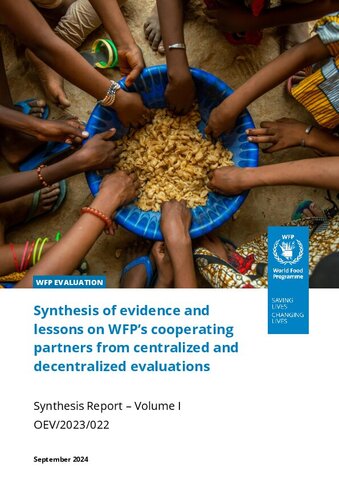
Cooperating partners, largely local non-governmental organizations and government partners, are fundamental to WFP’s work, with 31 percent of WFP’s 2023 contributions channelled through them. Given the scale and ubiquity of WFP’s work with cooperating partners, understanding cooperating partner management and WFP’s relationships with cooperating partners is an important consideration for its operations. The synthesis involved the review of 47 evaluations published from 2020 to 2023 with the aim of understanding the contribution and role of cooperating partners in WFP’s work and the factors affecting the quality of cooperating partner engagement and performance and the nature of WFP’s relationships with cooperating partners over time. The key findings emerging from the synthesis are as follows:
- Cooperating partners played a crucial role in WFP’s life-saving assistance, enhancing its ability to reach the most vulnerable and its access to hard-to-reach areas and improving targeting. There are capacity gaps, however, in areas such as technology and data management.
- Cooperating partners expanded WFP programming at the community level and supported institutional strengthening and advocacy.
- Attention to cross-cutting issues in cooperating partner work was inconsistent, partly due to variable guidance from WFP.
- WFP's selection of non-governmental cooperating partners is robust but hindered by financial constraints and the limited capacity of local partners.
- Long-term field-level agreements support planning, while short-term contracts are inefficient.
- Although WFP is seen as a flexible, responsive partner, administrative delays and multiple agreements reduce efficiency.
- Evidence on non-governmental cooperating partner performance is limited, and the approach to capacity strengthening was inconsistent.
- Relationships between WFP and cooperating partners are shifting from being transactional to being collaborative, with long-term contracts and flexible agreements, more consultation and equitable power dynamics. Further progress is needed, however, including through more systematic attention to cross-cutting issues, the enhancement of management practices and strategic engagement with non-governmental and government cooperating partners.
